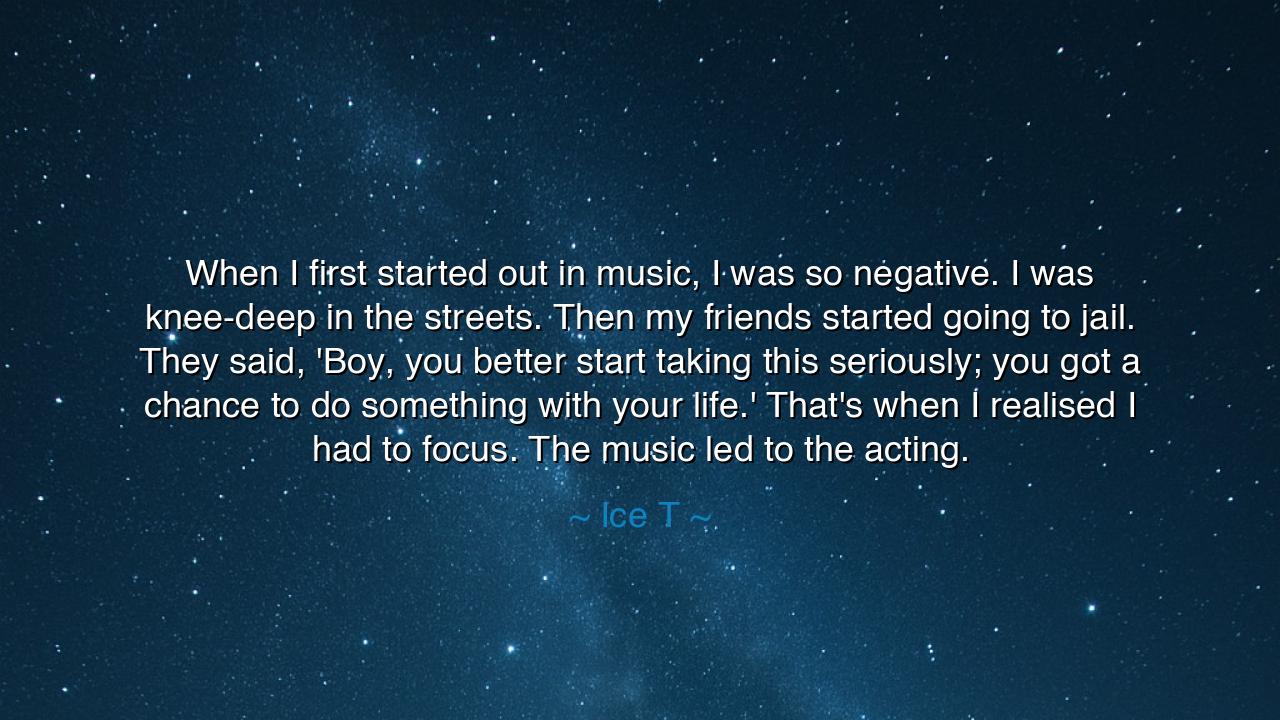
When I first started out in music, I was so negative. I was
When I first started out in music, I was so negative. I was knee-deep in the streets. Then my friends started going to jail. They said, 'Boy, you better start taking this seriously; you got a chance to do something with your life.' That's when I realised I had to focus. The music led to the acting.






In the words of Ice-T, "When I first started out in music, I was so negative. I was knee-deep in the streets. Then my friends started going to jail. They said, 'Boy, you better start taking this seriously; you got a chance to do something with your life.' That's when I realised I had to focus. The music led to the acting," we hear the reflection of a man who stood at the crossroads of fate and choice. His words speak to the transformation of the soul—how, from the depths of despair and a life clouded by negative influences, he found the clarity to change his path and embrace the potential that lay within him. It is a story that speaks to the power of focus, self-realization, and the transformative ability of art to lift a person from darkness into light.
Ice-T’s admission that he was once "negative" and "knee-deep in the streets" reflects a truth that many face: the overwhelming influence of environment. When surrounded by hardship, negativity, and the harsh realities of life, it becomes all too easy to be swept away by the current, to follow the path that seems most immediate and familiar. In this moment, Ice-T was like the ancient Odysseus, trapped in the chaos of his own circumstances, far from the hero he could become. The streets, for him, were a modern-day Cyclops, a trap that threatened to blind him to the greatness that lay just beyond his reach. But just as Odysseus had his moments of realization, so too did Ice-T, when the harsh truth of his friends’ fates broke through the fog of his negative thinking.
The turning point came when his friends began to face the consequences of their choices—jail, a symbol of the limits that the streets place on one's potential. "You got a chance to do something with your life"—these words were a call to action, a wake-up call that stirred him from the inertia of his life. It was the moment when the reality of his own potential collided with the crushing weight of his environment. Just as Plato’s allegory of the cave speaks of the blind prisoners who must choose to step out into the light, Ice-T found himself in a similar struggle, choosing whether to continue down a destructive path or to seek something greater. His realization came when he saw that the future he had been dreaming of was no longer a mere fantasy but a possibility he could shape with his own hands.
In the same way, the artist finds himself at the crossroads of choice. The journey of creativity is not just about the act of making art—it is about becoming the person capable of creating that art. Just as Michelangelo saw the statue of David in the marble before he ever touched his chisel, Ice-T saw his potential not in the streets, but in the music, in the craft he had already begun to hone. Music, for Ice-T, became the pathway to something more, the bridge that would carry him away from the constraints of his environment and into a world where his voice, his talent, could shine.
His words also speak to the power of mentorship and community. It was the voices of his friends, the ones who had fallen into the traps of the streets, that called him to attention. In their failures, they were able to show him the way—not by their success, but by their struggle. Their warning was not one of condemnation, but of care—they wanted something better for him. This is an ancient lesson: that those who have suffered often possess the wisdom to guide others. Their pain becomes a lesson for the next generation, and it is in the sharing of that wisdom that true growth occurs. Just as the elders of ancient cultures would pass down their experiences to their children, Ice-T’s journey was marked by the influence of those who had experienced the same trials and errors but had not the opportunity to break free.
From that point on, Ice-T found his focus. Music became his anchor, and it led him to acting, to fame, and to a platform where his voice could inspire others. His story is a reminder that focus and dedication can transform any life. Just as the ancient heroes were often propelled by a single moment of clarity or divine intervention, so too was Ice-T’s life turned around by his focus on his craft. He saw that his ability to create could provide him with not only a means of escape but a means of empowerment, of self-realization, and of legacy.
The lesson here is not just for artists but for anyone caught in the cycles of hardship or negativity: that change is always within your reach, but it requires focus, self-reflection, and the courage to walk away from the familiar in pursuit of something greater. Ice-T’s path shows us that even in the face of profound struggles, there is always a chance to choose a different path, to redirect our lives, and to harness our talents for a better future. Whether you are a musician, an artist, or simply a person seeking to overcome your own challenges, remember that the choice to focus on something greater can change the course of your life forever. Just as Ice-T used his music to change his destiny, so too can we use our own abilities to reshape our future.






AAdministratorAdministrator
Welcome, honored guests. Please leave a comment, we will respond soon